250 is the number of conductors who applied for the open Music Director position for the Peoria Symphony Orchestra. After selection committee members reviewed the applications and checked references, DVDs of past performances were requested from 57 applicants. 15 phone interviews were conducted after viewing the films, and from those conversations, 7 applicants were invited to guest-conduct one of this season’s performances in Peoria. From those 7, 1 will be chosen to lead the Peoria Symphony Orchestra (PSO) in future seasons.
After speaking with each of the seven contenders, it’s clear that we are dealing with seven unique individuals. While each of the applicants would fulfill the job’s duties, the passion, experience and background brought by each conductor to the podium ensures that no two of them would approach the position in the same way.
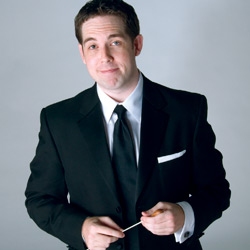 A Cornucopia of Passions
A Cornucopia of Passions
Michael Butterman believes that classical music has to be for everyone. Robert Franz wants to know the needs and desires of the community, and is passionate about what music can do in the educational process. George Stelluto has done research and co-authored articles on the correlation between conductors and business leaders. Brett Mitchell believes an orchestra’s programming should, in some way, reflect its geographic location. Sarah Hicks describes herself as a “cultural omnivore,” who was trained in classical music but greatly influenced by MTV. Leslie Dunner is interested in the pairing of music and movement and brings experience working with ballet companies and operas to the podium. Morihiko Nakahara thinks of concerts as emotional, but entertaining, experiences for the audience and musicians alike. He maintains that a good fit for a music director is in part determined by the chemistry between the conductor and the orchestra itself.
Several of the guest conductors likened the audition to going on a first date. Each party has to get to know the other and determine if the chemistry is right between them before a commitment is made. If either side is left wanting, it’s best to walk away and pursue other opportunities.
Everyone agreed that not only is the relationship between a music director and the musicians important, but the chemistry has to be right for the audience and community as well. Dunner noted that the programming he selects is spurred by the environment he’s in. Mitchell maintains that an orchestra’s physical environment should impact its music. “It seems silly to look at an orchestra’s programming and not be able to tell where it’s located geographically,” he said.
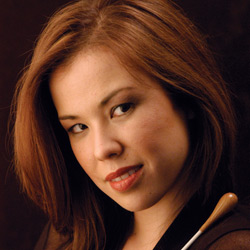 It’s also agreed that the audience has an active role in both programming and listening. Hicks enjoys audience communication and finding ways to incorporate the audience into the musical process. “There are few communal experiences left in our world,” she noted, “and I love being able to create those magical moments for both the orchestra and the audience.”
It’s also agreed that the audience has an active role in both programming and listening. Hicks enjoys audience communication and finding ways to incorporate the audience into the musical process. “There are few communal experiences left in our world,” she noted, “and I love being able to create those magical moments for both the orchestra and the audience.”
“Conducting is the hardest and easiest thing to do,” Hicks continued. “It’s the easiest because we’re not actually making any sound. It’s the hardest because we have to somehow convince 80 people in front of us to move a musical phrase in the same direction and have that really be communicated to the audience.”
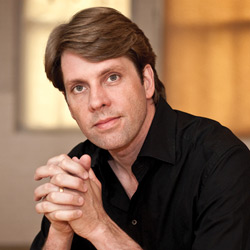 Butterman noted that the orchestra is a point of pride for Peoria and said that orchestras tend to mean a lot more to communities in the Midwest than in other parts of the country. Nakahara observed that the Midwest also has a thirst for lifelong learning, and he hopes to enhance the PSO’s current partnerships with other arts, cultural and educational groups to help facilitate music education for all ages. Franz wants to partner with local schools to increase students’ active listening abilities, and in turn, produce higher test scores. Stelluto already has ideas of how to work with corporate partners to utilize the “sophisticated problem solvers” who make up the Symphony.
Butterman noted that the orchestra is a point of pride for Peoria and said that orchestras tend to mean a lot more to communities in the Midwest than in other parts of the country. Nakahara observed that the Midwest also has a thirst for lifelong learning, and he hopes to enhance the PSO’s current partnerships with other arts, cultural and educational groups to help facilitate music education for all ages. Franz wants to partner with local schools to increase students’ active listening abilities, and in turn, produce higher test scores. Stelluto already has ideas of how to work with corporate partners to utilize the “sophisticated problem solvers” who make up the Symphony.
The passions and ideas of each conductor will help determine who will become the next PSO music director. And like anyone else, where they came from—their musical backgrounds—influences who they are and what they focus on today.
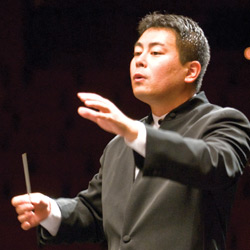 The Baton Beckons
The Baton Beckons
Morihiko Nakahara’s mother played the piano and taught him how to play the instrument and read music when he was just two or three years old. Growing up in Japan, where music education was a part of every student’s studies, he also learned how to play the recorder, percussion and other keyboard instruments. He later took up the clarinet, which led to his calling as a conductor. When he was in ninth grade, Nakahara’s band director, who was unable to conduct their last concert of the year due to a recent surgery, asked several students to each conduct a piece in his stead. Nakahara found that the movement of his hands and body while conducting that performance drew him into his career, and he eventually stopped playing the clarinet. “It took a lot of effort for me to be a decent clarinetist, and a lot of effort to be a decent conductor,” recalled Nakahara, “so I decided to focus all of my energy on being the best conductor I can be.”
Already an award-winning pianist, Sarah Hicks was forced to stop playing in her early teens after developing tendonitis. While her career as a pianist was over, her musical career certainly wasn’t. Her father suggested that, although she may no longer be able to tickle the ivories, she could still wield a baton. Taking his advice to heart, Hicks picked up a baton and began conducting her high school orchestra when she was 17. Admittedly owing her conducting career in part to her tendonitis, she thinks she would have eventually been drawn to conducting even if she had not been injured.
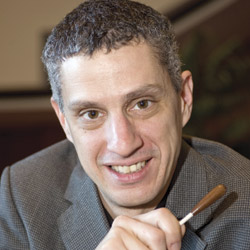 Like Hicks and Nakahara, Brett Mitchell began conducting in high school. One day, his band director was absent, and the substitute teacher—who was not musically inclined—asked if any of the students wanted to conduct rehearsal. Mitchell volunteered and did so well that by his senior year, whenever the director was gone, he would be excused from classes to conduct band and orchestra rehearsals for the day. The band director’s “sub file” literally read, “Bring a book.” Mitchell, too, has since given up the piano, which he learned to play at age six, to focus all of his energy on conducting. “I love playing the piano,” he said, “but [conducting] is what I want to do.”
Like Hicks and Nakahara, Brett Mitchell began conducting in high school. One day, his band director was absent, and the substitute teacher—who was not musically inclined—asked if any of the students wanted to conduct rehearsal. Mitchell volunteered and did so well that by his senior year, whenever the director was gone, he would be excused from classes to conduct band and orchestra rehearsals for the day. The band director’s “sub file” literally read, “Bring a book.” Mitchell, too, has since given up the piano, which he learned to play at age six, to focus all of his energy on conducting. “I love playing the piano,” he said, “but [conducting] is what I want to do.”
Robert Franz started out on the cello and switched to oboe in middle school, but hasn’t played either in 10 years—and he doesn’t miss it. For Franz, “conducting was a calling, not a choice,” and he knew with the first downbeat of his baton in a class in college that conducting was what he was meant to do. He left the oboe behind because the amount of time he was able to play the instrument was significantly reduced by the time he spent fiddling with the reeds. He decided his time could be better spent on the podium with a baton in hand.
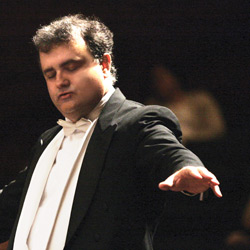 George Stelluto began playing the violin in third grade and learned the piano three years later. Almost as soon as he picked up his violin, he said, he knew he wanted to conduct. His teachers understood this, but guided him to play numerous instruments in different types of ensembles before picking up a baton. “They insisted I develop as a musician first, and then move into a leadership role,” said Stelluto. He learned to play the tuba in high school to increase his knowledge of brass instruments and better understand the bass clef, which has proven to be helpful in his conducting career.
George Stelluto began playing the violin in third grade and learned the piano three years later. Almost as soon as he picked up his violin, he said, he knew he wanted to conduct. His teachers understood this, but guided him to play numerous instruments in different types of ensembles before picking up a baton. “They insisted I develop as a musician first, and then move into a leadership role,” said Stelluto. He learned to play the tuba in high school to increase his knowledge of brass instruments and better understand the bass clef, which has proven to be helpful in his conducting career.
Unlike Stelluto, Michael Butterman didn’t know he wanted to be a conductor until after graduating from college. While studying chemistry at the University of Virginia, he did a great deal of accompanying for the school’s choral groups. The choir director, who was set to leave on sabbatical the year after his graduation, asked Butterman if he would like to stick around and conduct in his place. Already familiar with the players and the repertoire, he accepted the offer and found that he loved to conduct. He continues to play the piano, giving recitals from time to time, but focuses most of his time on conducting. Butterman believes it’s important to retain the role as a creator of music when serving as a conductor.
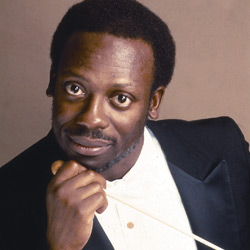 Leslie Dunner’s journey to the podium was much like Butterman’s. As an engineering major in college, he took a conducting class for fun in his sophomore year. While not initially considering it a career option, Dunner found that he liked conducting more than he would have thought. With a musical background from playing the clarinet since seventh grade, he decided to take more classes to see where they would lead. Dunner soon found that, like Franz, he was called to conduct. He continues to play the clarinet and hopes to do more with chamber groups
Leslie Dunner’s journey to the podium was much like Butterman’s. As an engineering major in college, he took a conducting class for fun in his sophomore year. While not initially considering it a career option, Dunner found that he liked conducting more than he would have thought. With a musical background from playing the clarinet since seventh grade, he decided to take more classes to see where they would lead. Dunner soon found that, like Franz, he was called to conduct. He continues to play the clarinet and hopes to do more with chamber groups
in the future.
Getting to Know Each Other
Michael Butterman was the only guest conductor to grace the stage at the Civic Center Theater by the time of this writing, and he set the bar high. Wowing committee members, musicians and the audience alike, Butterman kicked off the 2009-10 season on a high note. PSO Artistic Advisor Michael Morgan exclaimed, “The first concert was incredible—the orchestra sounded great, [Butterman] did a great job, not only in the concert, but also in the community work, which is what’s really important here.” Gary Panetta of the Peoria Journal Star reported, “He gets high marks for choosing unfamiliar music that was not merely accessible, but positively contagious—and extremely well-performed.”
By the time this issue hits your mailbox, Sarah Hicks will have given her guest performance as well. From talking to this remarkable young conductor and hearing what others have to say about her, I am sure she will not have disappointed.
Just two of the guest conductors will have visited Peoria prior to their week-long auditions. Brett Mitchell taught at Northern Illinois University from 2005 to ’07 and frequently brought his musicians to Peoria to perform or attend musical performances. George Stelluto took time out of his schedule at the Ravinia Festival in Highland Park, Illinois, this past summer to drive down and check the River City out for himself. “It was great,” he exclaimed. “The city is impressive, has a beautiful setting by the water and surrounding hills, and I could see the signs of a healthy, vibrant community almost everywhere: industry, businesses, great hospitals, recreation, nature, and education and culture.”
Those conductors who have not yet walked our streets have, however, conducted their own research on our city and its orchestra, and all seem genuinely excited to check it out in person. Dunner is anxious to get a sense of what’s going on in Peoria culturally. “One never knows what one is going to find,” he said. Franz can’t wait to see it for himself. From his phone interview with the selection committee, he said, “It was clear right away that the orchestra has a great attitude, a great outlook…and is really excited about what the future holds.”
Indeed, Peorians are also excited about what the future holds for the Peoria Symphony Orchestra. With a season-long audition process, the suspense will build as to who will lead the orchestra, audience and community into many great years to come. Grab your tickets and see the guest conductors in action by calling 671-1096. a&s


